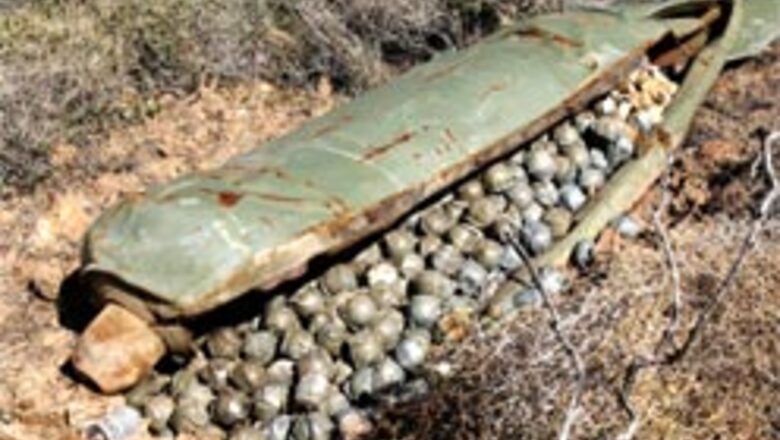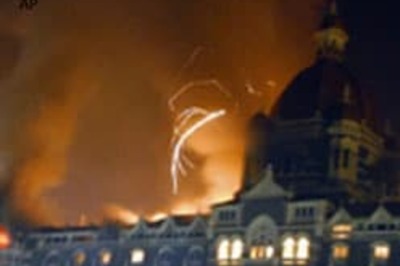
views
Oslo, Norway: Forty-six countries agreed to push for a global treaty banning cluster bombs, a move activists hoped would force the superpowers that oppose the effort – the US, China and Russia – to abandon the weapons.
India, Australia and Pakistan also did not attend the Oslo conference.
Organisers said Friday’s declaration was needed despite the absence of key nations at a conference in the Norwegian capital to avoid a potential humanitarian disaster posed by unexploded cluster munitions.
UN Secretary-General Ban Ki-moon ''is encouraged by the declaration'' and ''welcomes all progress to reduce and ultimately eliminate the horrendous humanitarian effects of these weapons,'' UN deputy spokeswoman Marie Okabe said.
Cluster bomblets are packed by the hundreds into artillery shells, bombs or missiles which scatter them over vast areas, with some failing to explode immediately. The unexploded bomblets can then lie dormant for years after conflicts end until they are disturbed, often by children attracted by their small size and bright colors.
Of the 49 countries attending the Oslo conference, only Japan, Poland and Romania rejected the declaration calling for a treaty by next year. Some key arms makers – including the US, Russia, Israel and China – snubbed the conference.
But even deeply skeptical nations such as Canada, Britain and Germany were swayed to join the Norwegian-led initiative in what activists hailed as a major step forward.
Jody Williams, an American who shared the 1997 Nobel Peace Prize for a global campaign to ban land mines, urged nations supporting a cluster bomb treaty to move ahead without the major powers.
''They should do it the same way, with countries that realise that there are 191 countries in the world, and not just three,'' she told The Associated Press.
Last summer's Israel-Hezbollah war helped bring cluster munitions to the forefront of the international agenda. The UN estimated that Israel dropped as many as four million bomblets in southern Lebanon during the conflict, with as many 40 percent failing to explode on impact.
Mark Regev, spokesman for Israel's Foreign Ministry, said Israel did not use any munitions that were outlawed by international treaties or law. He said if the cluster bombs declaration evolves into a treaty, Israel would examine it and then decide how to respond.
Countries opposed to the Oslo conference say cluster bombs are being discussed under the UN Convention on Conventional Weapons.
PAGE_BREAK
In Washington, State Department spokesman Sean McCormack said the convention has produced a treaty the US has signed and forwarded to the Senate for ratification. He did not provide details on what the treaty says about cluster bombs.
''We have taken very seriously the international discussion with respect to the threat posed by unexploded ordnance to innocent civilians,'' McCormack said.
He said the US has spent about US$1 billion over the past decade to help clean up unexploded munitions in East Asia, Southeast Europe and the Middle East. He added, however, that cluster bombs ''do have a place and a use in military inventories.''
Norwegian Deputy Foreign Minister Raymond Johansen, who co-chaired the Oslo talks, said the discussions were not intended to replace the UN negotiations, but simply to energise the process. ''This meeting has been very successful,'' he said. ''Our goal is to reach the same number of countries as the land mine treaty – 153.''
Norway called for the Oslo talks after the latest round of UN negotiations on cluster munitions failed in November. Foreign Minister Jonas Gahr Stoere said the 1997 effort to ban land mines showed that waiting for the major powers to come around would take too long, and that other countries have to push ahead.
''We have given ourselves a strict deadline for concluding our efforts,'' he said. ''This is ambitious, but we have to respond to the urgency of this humanitarian problem.''
The declaration urges nations to ''conclude by 2008 a legally binding international instrument'' to ''prohibit the use, production, transfer and stockpiling of those cluster munitions that cause unacceptable harm to civilians.''
It also calls on countries to take steps at a national level before the treaty takes effect. Austria, Belgium and Norway already have cluster bomb bans, and Bosnia has announced plans to enact one, organisers said.
The declaration said treaty talks would be held in Peru and Austria later this year and in Ireland in early 2008.
''Countries that we thought would walk away from these proceedings have decided to support them,'' said Simon Conway, a delegate from Britain's Land Mine Action group. ''With Germany, Canada and Britain on board, those who say this was just a couple of small nations are wrong.''
Steve Goose of Human Rights Watch said the major powers do not need to be involved for the treaties to have an impact, since say the point is to stigmatise such weapons.
''If you need proof that you can conclude a treaty without the United States, Russia and China, look at the land mine treaty,'' he said. Despite rejecting that treaty, Goose said, the major powers have stopped deploying land mines and the number of civilian casualties has been cut in half since 1997.



















Comments
0 comment